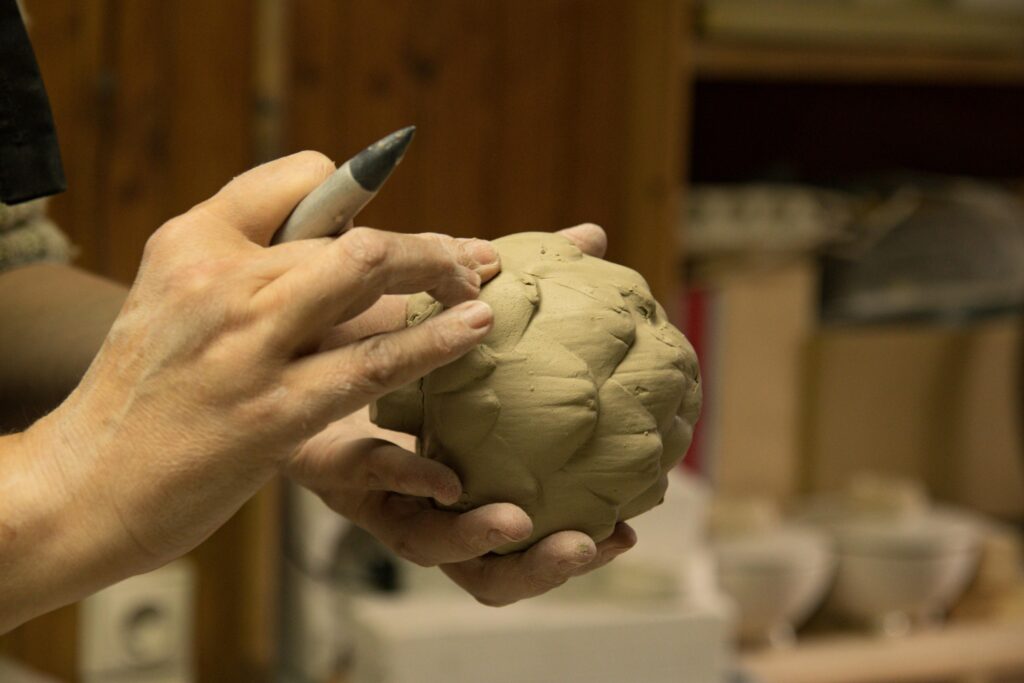Rasa Justaite-Geceviciene
The pivotal theme in Rasa’s creative work is interpretation of plants, which express the perpetual motion in the natural world, unrivalled in individuality and surprise. Every single thing in the natural world can be viewed as a separate landscape. One can regard it as tangible or abstract, studying in separate pieces or particles. One can look at it from a great height or watch it within an inch. Rasa creates her ‘landscapes’ using colored clay bodies and glazes, and employing various decoration techniques. She encrusts stone, wood or metal with ceramics in an ingenious way. Skillfully combining different substances the artist invites you to observe, to touch or even to take a walk upon her landscapes of feelings…
Since 1994 she has been actively participating in Lithuanian and international symposia and exhibitions: in Poland, Italy, Moldova, Latvia, the Netherlands, Turkey, Romania, Estonia, Germany, Ukraine, Taiwan, South Korea.
She has already organized 9 solo exhibitions.



“In her teenage years, Rasa Justaitė-Gecevičienė turned her back on chemistry and mathematics, choosing ceramics instead. However, her studies did not only provide the basics of composition and art, but also immersed her in the subtleties of ceramic technology. An alchemic process, pottery requires both formulas and calculations – all of which she once ran away from, but now finds great pleasure in <…>
What fascinates you most about ceramics? A special formula can be applied to it: alchemy plus a long and patient work process equals ceramic creation. Also, I put a lot of emphasis on craftsmanship and the quality of the finished piece.“
Excerpt from an interview with the Homo Faber Michelangelo Foundation. (An international non-profit organization based in Geneva, Switzerland which celebrates and preserves master craftsmanship around the world and strengthen its connection to the world of design.).
https://www.homofaberguide.com/en/discover/discover-rasa-justait-gecevi-ien
“My childhood and adolescence – “on the asphalt”, but with the wind in my hair and a key under my neck. I remember such a self, a naughty, self-reliant, who escaped from the house one day, but I do not regret a single day.
At the moment, without ceramics, I cannot imagine my life, my work. It has become my way of life. The day starts with lectures on ceramic technology at the Department of Ceramics of Vilnius Academy of Arts, in the afternoon I usually go to the workshop, which I finally set up under the house. I live in the garden, on the outskirts of Vilnius, so I spend every free minute in the flower gardens, in the greenhouse or drinking tea by the outdoor pool. Nature and plants are my source of inspiration. I’m rational. I always follow my mind in life. When starting a new piece, I often see many steps forward, like on a chessboard. I do a lot of homework: I look for and systematize information, I put it in “drawers” in my mind, create a course of activities and only then do I start. I don’t have a lot of free time and money that I could afford to experiment just out of feeling“
Excerpt from prof. Ramutė Rachlevičiūtė’s book “142 Openings: Autobiographies of Lithuanian Artists”, 2021. Publisher: Lithuanian Section of the International Association of Art Critics (AICA). ISBN: 9786099623719
